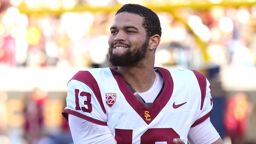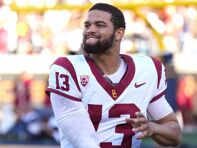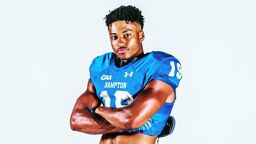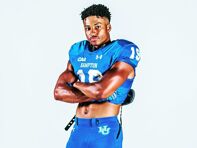It was the moment T.J. Callan felt beyond a doubt that he was not welcome as a gay man on the University of Miami football team.
The running back was eating lunch at a table at training camp before the 2018 season when a teammate asked him if he’d seen the movie “Moonlight.” Set in Miami, the film’s story centers around the life of a young black gay man struggling to find his way. Rumblings had been sifting through the team about Callan liking guys, though he never acknowledged it to them in any way. The question was their way of prying open the closed window into his private life.
One of the team staff members sitting with the players piped up.
“Oh ‘Moonlight,’ I’ve seen it, and I was disappointed with it,” Callan remembers the staffer saying.
Callan’s ears perked up. During his time getting to know the staffer, he had come to believe that of everyone associated with the team, this person might be the one person he could come out to. Themes of acceptance and forgiveness had been present in their one-on-one conversations about life. Callan felt like he was someone who wouldn’t judge him for who he was.
“Coaches were saying stuff, teammates were saying stuff, and it was this person I felt I could confide in,” Callan says. “I was getting close to telling him. I had to tell someone or I was going to go insane.”
In that moment at that lunch table, Callan thought he would hear a message from the staffer to his teammates about loving and accepting gay people. As a closeted gay man on the team who was now the target of whispers and rumors, he thought this could be a turning point away from the harassment and hatred he had experienced. Callan’s heart raced as hope filled his mind.
Instead, the staffer broke his heart.
“It’s sad to see where the world has come to with this whole homosexuality thing,” Callan remembers him saying. “I’m never going to say someone is gay, I’m going to say someone is ‘struggling with their sexuality.’ They aren’t gay. They are just letting the devil win.”
The message Callan received was clear: If he was gay, he wasn’t welcome at that lunch table and he wasn’t welcome on the football team.
“Everyone respected him, including me at the time, and he was just talking hate,” Callan says.
It also became painfully clear to him in those moments at lunch, and as he played back the tape in his head in the following days, that if he were to stay on the team he would be subjected to more and more conversation demeaning who he was as a person. The whispers about him had already driven a wedge between himself and the team. He knew after the staffer’s comments that it was never going to get better.
Callan called his parents, crying. What had been his sanctuary — football — had increasingly been closing its walls in on him. His mother encouraged him to quit the team, concerns about her son’s mental health creeping into her mind. His father told him that if his teammates and team leaders were acting like this, he shouldn’t feel he has to stay.
The young man knew he had a choice to make. Who he was had been set on a collision course with what he wanted to do.
He could not be gay and be on this Univ. of Miami football team.
Acceptance in high school disappeared at The U
Homophobia in the locker room had been a foreign concept for Callan when he first encountered it at Miami.
In his teens he had suited up at a more progressive environment — Ronald Reagan High School in Doral, just west of Miami. There, Callan was out to many people at the school and on his track and football teams. He said he never experienced any negativity about being gay at his high school. He was elevated to captain of both teams, garnering the respect of teammates and coaches.
After earning his high school diploma, he was looking forward to joining his new team in Miami, where he figured he would be out from the first moments, able to sink himself into the freedom of life experiences so many yearn for in college.
Yet he quickly found the Miami football team was “a totally different environment” from what he was used to at his high school.
When he got to Miami, the homophobia had started as simply crude comments about a host of issues. He remembers one teammate talking about gay marriage in terms of bestiality, wondering aloud, “What, are they going to let them marry animals next?”
One of the team trainers was perceived as being more effeminate by some of the players, Callan says. So the trainer was the focus of some whispers when he wasn’t in the room.
“Guys would say, ‘I’m not going to bend over near him because he’s going to try to fuck me in the ass,’” Callan remembers. “They would say absurd things, and it made me upset that I couldn’t combat it. They just didn’t know better. This is how they were raised. I wasn’t sure how extreme it was, so I just kept my mouth shut.”
Callan feared if he defended gay people or same-sex marriage, or in any way seemed like he was not homophobic, the players would target him and discover what Callan by then had realized he had to keep a secret.
‘I can still remember every single person who said something to me. It was traumatizing at the time. I would get devastated.’
As time went on, and he was noticeably absent from the piling-on of homophobic taunting, that’s exactly what they did.
“I can still remember every single person who said something to me. It was traumatizing at the time. I would get devastated. Like when your heart just drops and you get cold, that’s how I’d feel every time someone talked shit about gay people, because it felt like they were saying it about me.”
One graduate assistant asked him if he “liked titties.” A teammate asked him if he wanted to be a girl. When he tossed a ball badly to one of his coaches at a practice, the coach said, “you know I’ve heard things about you and now I’m starting to think they’re true.”
Simply trying to find his way on the team, he felt he was slowly being shown the door.

An ‘undercover faggot’
Even with all of this as a backdrop, Callan couldn’t run away from who he was. As he was slowly being pushed off of the Miami football team, Callan was rebelling against the ignorance. His sophomore year he quietly attended Miami Pride, where he blended into the huge crowds. His junior year he took it a step further, wearing his high school football jersey to Pride.
“That was my mini-defiance,” he says. “I was there and nobody could say anything to me. I wanted to show some representation. It had an internal meaning to me.”
As he quietly explored his private life away from the team, word filtered back to some of the players that Callan might be gay.
”Looks like we have some undercover faggots on the team,” he recalls one teammate saying in the locker room.
Callan has one particular film session etched in his mind forever. The offense was looking at a defensive formation and the coaches asked the players to figure out how to best attack it. After about 10 minutes of the players sputtering around, Callan blurted out the answer the coaches were looking for. The room erupted in cheers, players and coaches patting him on the back and shaking his hand.
One teammate put up his hand for a high-five, but when Callan went to meet the gesture, the player pulled his hand down.
“I’m never going to shake hands with a n——r who sucks other n——s’ dicks,” the player said.
Everyone heard it. The room went silent. Callan was crushed. A big, breakthrough moment for him as a player had been turned into a complete rejection of who he was as a person. His very presence on the team was rejected — Despite his football acumen in that moment, regardless of his ability to help the team, he was not welcome by that player in that room.
“It shut me down,” Callan says. “After that I didn’t reach out to people to help me with plays. Especially in big groups. The second they would start talking about intimate stuff or ragging on each other, that’s when I would get up and say, ‘I gotta go,’ ‘cause I knew where it might be headed.”
Callan says his performance clearly suffered as he spent more and more time trying to keep the taunting at bay.
“I was trying to avoid the facility and the team, and I was spending so much energy trying to make sure people didn’t find out.”
‘I wish I knew then what I know now’
Callan wishes his defiance of their homophobia had been more ever-present.
If he could go back and relive his experience on the Miami football team, he would correct his teammates when they made ignorant comments. He would talk about the guy he was dating when someone asked him about liking “titties.” He would stand up to the staffer who expressed discriminatory comments about gay people.
Yet in the middle of his personal experience, standing in a locker room that had become a dark place in his life, none of this seemed possible.
“I wish I knew then what I know now, because I would have stood up for myself. If I could go back with this same mentality, now I’d be more focused. Now I have the strength to speak up.”
‘I would definitely love to re-do my experience and not give a fuck what other people thought, and see where that took me.’
Callan thinks it’s possible that if he had embraced who he was with his team, and had been strong in his convictions as a gay man, many of the people on the team may have embraced him. Yet it was a risk he felt, at the time, he couldn’t take.
“Some people portray ideas they don’t even believe or understand,” he says. “They just do it to feel cool and fit in. I would definitely love to re-do my experience and not give a fuck what other people thought, and see where that took me.”
Maybe Callan’s biggest disappointment was in the teammates who accepted gay people. The men who led the anti-gay commentary and attacks were a minority on the team. He knows that now. Yet they were a very vocal minority, and what made them emboldened and louder was the fact that Callan can’t remember a single player or coach on the team ever saying a word to correct it. Not once.
Since leaving the team in the middle of the 2018 season, Callan has discovered that some of his teammates have gay siblings or family members. Many of the players who have learned he’s gay, Callan says, do not care.
If he had heard positive messages about gay people from people in leadership positions in the locker room or on the coaching staff, Callan thinks that may have helped him avoid the emotional spiral that send him spinning from the team.
“Nobody was saying anything, nobody was defending me,” Callan remembers. “So I figured, OK this must be the general rule here. I guess it’s time for me to shut up and move on.”
Part of the solution
Callan wants to be part of the solution. He knows now that there is a place for gay men in football. He wants to empower them to take that rightful place.
In sharing his story, he hopes he can open the eyes of coaches and administrators about the impact of a homophobic environment on the lives of athletes.
‘Letting other athletes know there are people like them going through similar situations is important to me. It’s not the end of the world.’
He was adamant from our first conversation that the names of the specific people involved not be mentioned in this article, because it’s not about the individuals, it’s about the whole system and the failure to adequately get ahead of this behavior.
“I’m not trying to paint anyone as a bad guy or play the victim. It was definitely a growing experience. When I left the team I was able to flourish and experience who I was and get comfortable with myself. It just felt so lonely in there. So letting other athletes know there are people like them going through similar situations is important to me. It’s not the end of the world.
“The fact you feel so alone and so isolated, balancing all of these lies, I feel like if I’d seen someone talk about how to navigate this, it would have helped me.”
Still, he knows his former head coach — Mark Richt — was the very public face of the team and the coaching staff. Callan remembers Richt as a nice man. He never heard Richt say anything anti-gay, and he’s not sure Richt was aware any of this homophobic activity on his team. Callan never told Richt, or any of the coaches, about what he’d seen and heard.
Outsports also reached out to the Miami athletics department, and their statement is included above.
In his darkest times, Callan turned to the internet — namely coming-out videos on YouTube — for inspiration. He hopes sharing his story, and being a resource for gay athletes, will help someone going through what he went through.
“They made me feel like less of an alien,” he says of those videos.
Callan graduated from Miami last May, and he is now applying to masters programs focused on higher education and community change. He wants to work with athletes and help them navigate their lives, being a resource to them, knowing there are people they can talk to.
The one person in the athletics program he felt he could talk with — a woman named Millie — was part of the academic advisory team, and “speaking to her felt like home.” She gave him hope.
The rainbow pride flag in her office stood as a clear indicator that she was a safe haven from the hatred he heard in the locker room.
He hopes that in turn he can be another athlete’s Millie and give them hope too.
You can find T.J. Callan on Instagram @tjthelamphead, or on Facebook.
If you’re an LGBTQ athlete or coach looking to meet other people like you, head to Facebook and join the communities at GO! SPACE or the Equality Coaching Alliance.



































